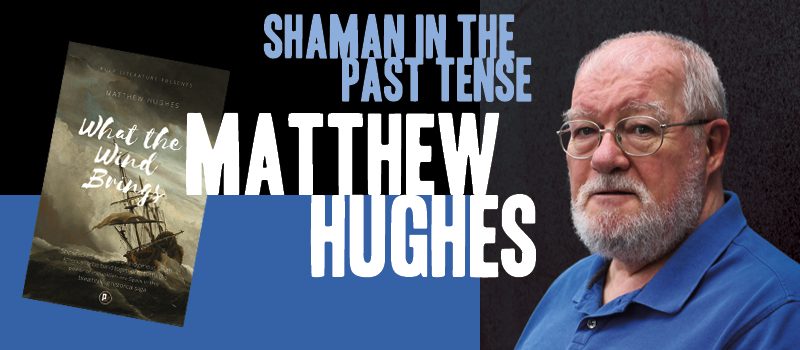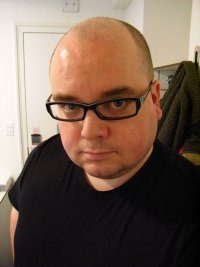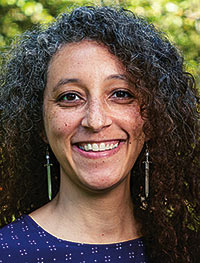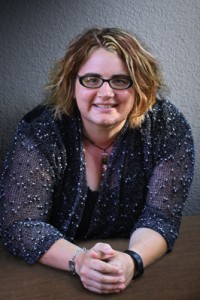Matthew Hughes: Shaman in the Past Tense

Matthew Hughes was born May 27, 1949 in Liverpool, England. His family emigrated to southern Ontario, Canada when he was five years old, and then moved to Vancouver when he was 13. He attended Simon Fraser University but left school before graduating. He has worked various jobs, but spent most of his career as a freelance writer, including nearly 40 years as a speechwriter for various Canadian politicians and corporate executives.
He began publishing in the early ’80s, mainly crime fiction. His first significant SF work was the Filidor Vesh series, with two novels, Fools Errant (1994) and Fool Me Twice (2001), collected in omnibus form as Gullible’s Travels (2001). The series takes place in his Archonate universe, inspired by Jack Vance’s Dying Earth sequence. He further explored that world in numerous sub-series with various leading characters, including the Henghis Hapthorn series: Majestrum (2005), The Spiral Labyrinth (2007), Hespira (2008), and collection 9 Tales of Henghis Hapthorn (2013); the Guth Bandar series in The Commons (2007) and Nebula Award finalist “The Helper and His Hero” (2007); the Luff Imbry series in novella Quartet & Triptych (2010), Endeavour Award-nominated collection The Meaning of Luff and Other Stories (2014), Philip K. Dick Award finalist The Other (2011), novella The Yellow Cabochon (2012), novella Of Whimsies & Noubles (2014), novella Epiphanies (2016), and collection Forays of a Fat Man (2019); the Kaslo Chronicles in A Wizard’s Henchman (2016); the Raffalon series in 9 Tales of Raffalon (2017); and lots of associated short fiction. Other Archonate works include Aurora Award finalist Black Brillion (2004), Template (2007), and collection The Gist Hunter and Other Stories (2005).
Hughes’s To Hell and Back series includes The Damned Busters (2011), Endeavour Award finalist Costume Not Included (2012), and Hell to Pay (2013).
Other books include A God in Chains (2019) and collection Devil or Angel & Other Stories (2014). Suspense novels Downshift (1997) and One More Kill (2018) appeared under the name Matt Hughes. He also wrote a Wolverine tie-in and a Pathfinder Tales novel, both as Hugh Matthews.
Forthcoming books include contemporary fantasy Ghost Dreams and historical novel What the Wind Brings.
Hughes married his wife in the late ’60s, and has three adult sons. For the past dozen years he’s traveled the world with his wife, living in 12 countries as an unpaid housesitter.
Excerpts from the interview:
“I grew up as part of the working poor and I had a very dysfunctional family and an unhappy home life. I never had much in the way of books until after we moved to Vancouver. Once I got to high school in grade nine in Ontario we had a school library, and then I started to read. I spent a lot of my time in libraries. Before that, we were often in farmhouses, out in the country, with no bookmobile and no library. My father was unskilled labor, and sometimes a used car salesman. He had been a head salesman in a big department store in Liverpool, but we lost everything when we came to Canada. We plunged into poverty and stayed there. One time he had a job in a rubber factory and was doing quite well, but then he broke his back in a car accident and lost that job. We tried running a little restaurant for a while and that failed. He was in construction for a while, renovating restaurants, and then he got in trouble with loan sharks, and that’s when we had to move suddenly from Ontario to Vancouver. I had about one hour’s notice that we were leaving. It wasn’t the first time that happened to me. I had a very unusual upbringing.
“As a teen, I read widely. I started with historical novels, because one of the first books I ever read was a juvenile historical novel that was on the syllabus for high school in Ontario. I got hooked on those. Once I got into grade nine and had that school library, I started to read an awful lot of science fiction as well as historicals. When we got out to Vancouver and there was a library I could go to, I read everything. I read Hemingway and Kazantzakis and Steinbeck and Robert Graves. Virtually anything I could lay my hands on. I read Catch-22, was quite taken with that, and started reading any kind of black humor I could find, Terry Southern and so on. In 1965 I came across The Lord of the Rings, in that Ballantine edition, and then I started reading as much fantasy as I could, at least up until Terry Brooks came along and changed the field.
“When I was in grade nine, I discovered I had a real facility for writing. I got A’s on my English essays. I got C’s in everything else, because I hated going to school. I started thinking, ‘Well, I could be a writer because I really like writing and I’m good at it.’ I had no idea how to make a living as a writer. By the time I was in grade 12, end of high school, I was thinking I might be an advertising copywriter. I even went downtown in Vancouver to the biggest ad firm they had and met one of the partners and talked about it. I’m really glad I never did that, because I’m sure it would have eaten my soul. At the age of 16, I wanted to write a historical novel along the lines of the ones by L. Sprague de Camp, which I was reading in those days. An Elephant for Aristotle. I’d come across a wonderful bit of historical trivia: that Alexander the Great, before he died in Babylon, told a ship’s crew to go and circumnavigate Africa, and off they went. Nobody knows what happened after that, because before they could come back, if they ever came back, Alexander’s empire had fallen apart. The Companions were fighting each other for precedence and territory. I started to write about that, and wrote the first chapter on summer vacation, then realized it was a lot more work than I could handle in my dysfunctional household, with all the fights and the shouting and the drinking and so on. I recently revived that idea, because I’ve now got a historical novel coming out, and I think I might give it a try. It’s still a great idea. I know a lot more now than I did back then.
“I took any job I could get. If you’re working poor, you take any job because you have to live, and there’s no cushion to fall back on. I worked at a factory that made school desks in the summer. I was a kind of orderly in a kind of private mental hospital for a while when I was 17. That was unusual. I delivered groceries. I joined the Company of Young Canadians at one point – that was a strange thing. You probably know absolutely nothing about that. It was like VISTA in the States, Volunteers in Service to America – the domestic Peace Corps? We had that in Canada, the Company of Young Canadians, and the politicians who set it up thought it was going to be clean-cut kids in sweaters with red maple leaves on the front cleaning up parks and helping old ladies with their groceries. Unfortunately, to organize and run it, they hired disciples of Saul Alinsky, the community organizer. Because of that I spent several months living in a log cabin in northern Alberta with Métis people, fought a forest fire, drank bad water from a lake and almost died of whatever it was in my guts. That was one of my jobs.
“I have had a varied and unusual life, I suppose. My wife says I shouldn’t mention this, but there’s a strong streak of minor criminality that runs through my family. I can cite dope dealing, arson, fraud – the working poor often slide into things you shouldn’t do, because you’ve got to do whatever you can do to make a living. I’m the white sheep of my family and I’m the only person in the world who’s been an assistant on the personal staff of the Canadian Minister of Justice and also a teenage burglar. I can truthfully say that I have flown in private jets and drunk champagne in the executive suite with CEOs of billion-dollar corporations, and I’ve also been a teenage kid, lost on some lonely road with two bucks in my pocket 500 miles from home.
“I dropped out of university and became a newspaper reporter in Vancouver, and I was, first, summer staff on a daily, then news editor on a little weekly, and then editor of a tabloid weekly in another town. I got an offer from a newly elected Member of Parliament to come to Ottawa with him and ghostwrite his column for the riding press, which I did, along with all the other stuff, like helping people with their passport problems or unemployment insurance and all of that. By a fluke, I’d been there about six weeks and he came into office and said, ‘I’m going to second the debate on the Speech from the Throne,’ which is a big speech the Governor General makes at the opening of a new Parliament, where the government sets out all of its agenda. It’s a big deal. It’s like replying to the State of the Union in the States, and he was seconding the motion. I had to write him a speech. I went down to the Speaker’s office and got some examples and wrote it. One draft, and he loved it. He went out and gave it in the House of Commons, and it was a big hit. He started getting invitations from all kinds of people to come and give speeches, so now I was writing speeches. The next thing I knew, I was getting looked at by the staff of Cabinet ministers’ offices as this hot new speechwriter that nobody had heard of. I got a job in one of those offices. I worked for two of them – the Minister of Justice and the Minister of the Environment. I spent four years altogether in Ottawa, and then I went back to Vancouver and freelanced as a speechwriter from 1979 to 2007, so almost 30 years.
“At one point I thought I could retire from speechwriting. I invented the next big game after Pictionary. I was part of the Mensa game-playing group in Vancouver, and we used to get together and play 11-hour board games on the weekend. We set up a company to make games, because one of us knew the people who created Trivial Pursuit. We had a good game, Gender Bender, my invention, about male and female stereotypes, a good party game. We took it to the Trivial Pursuit guys, and they took it to New York, and they licensed it to The Games Gang, which made Pictionary. We launched in 1989, and sold 115,000 games, which was pretty good. We would have gone on to be rich, probably, except in 1990 Nintendo came along, and board games were all over. Everything changed, almost overnight.”
Interview design by Stephen H. Segal. Photo by Liza Groen Trombi.
Read the full interview in the December 2019 issue of Locus.
 While you are here, please take a moment to support Locus with a one-time or recurring donation. We rely on reader donations to keep the magazine and site going, and would like to keep the site paywall free, but WE NEED YOUR FINANCIAL SUPPORT to continue quality coverage of the science fiction and fantasy field.
While you are here, please take a moment to support Locus with a one-time or recurring donation. We rely on reader donations to keep the magazine and site going, and would like to keep the site paywall free, but WE NEED YOUR FINANCIAL SUPPORT to continue quality coverage of the science fiction and fantasy field.








